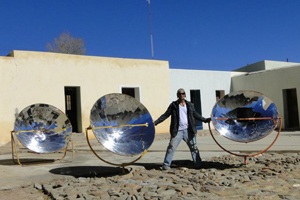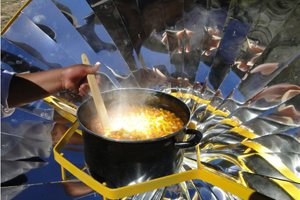Skiers and riders from around the world have come to rely on South America Snow Sessions for satisfying their summer backcountry fix. As the powder-hungry probably know by now, emissions from engines of all sorts, including planes, are stacking up as the number one threat to cold and consistent winters around the world. Now, with a carbon offset program in partnership with Wulcon Energy and the Ecoandina Foundation, the climate-conscious can choose to make sure their travel to and from Argentina isn't just pumping more CO2 into the atmosphere.
"We took an inventory and saw that about 85 percent of the carbon footprint of our trip to Argentina was caused by the flights," says SGT (SASS Global Travel) Sustainability Consultant Ryan Dunfee. "So retrofitting windows or some other project at our Bariloche compound really didn't seem to have as much of a net impact as focusing on the flight emissions."

Courtesy of SASS
This is a solar kitchen.
Companies hoping to offset the impact of their operations typically partner with a carbon offset provider. The money from purchasing carbon offsets is invested into projects that should prevent more carbon from being released into the atmosphere, such as renewable energy like solar and wind. It sounds like a one-to-one erasure of a companies' impact, but problems arise when an offset provider deals in projects that have already been fully funded, or don't ever come to fruition
In SGT's case, Dunfee wanted to tackle the large impact of client and coach plane travel, and make sure their offsets were put to work locally. Dunfee connected with Martin Wainstein of Wulcon Energy, one of Argentina's first sustainability consultancies. Funded by SGT coaches and clients, Wainstein completed their first carbon offset project this past summer, installing two solar kitchens and a energy efficient stoves for rural high-desert villages.
"When he offered the idea of funding a self-contained local offset project, not just contribute cash to some huge wind farm, it was really attractive," says Dunfee. "Plus these solar kitchens and the heat-efficient stoves help these communities on a social level, even more than the reduction in CO2 emissions."

Courtesy of SASS
This is how a solar kitchen works.
Replacing conventional cooking stoves fueled by shrub wood, and providing high-efficiency heating stoves that reduce the amount of firewood needed, the project will offset "150 tons of CO2 over the next 20 years." That's equivalent to 30 round trip flights from Boston to Argentina, according to Dunfee. As he mentions, the project offers a great side-benefit: freeing up the villagers from the time-consuming labor of gathering fuel wood.
"You have young kids who are in school, and villagers who are trying to scrap out a living in a very rugged landscape, and all of a sudden they now have a few more hours in their day to do something productive instead of looking for firewood," says Dunfee.
No doubt getting to South America to score some August backcountry lines is a good investment. But, as Weinstein notes, an even more important one is making sure that climate change doesn't win -- and a great place to start is taking on the impact of travel when skiers and riders head out to play.
"We spoil ourselves and get to travel the world and use up all these resources that it has to offer without giving anything back," says Randall Stacy, a Rome am rider and SGT guide intern who offset his flight to Argentina through the project. "I realized that donating solar ovens to these people would be a small change in our lives and an enormous change for them. Then again, that gets me thinking: if a small change for me did so much for them, what would happen if we all made big changes in our lives to help the world?"
Story by Jesse Huffman, ESPN


No comments:
Post a Comment